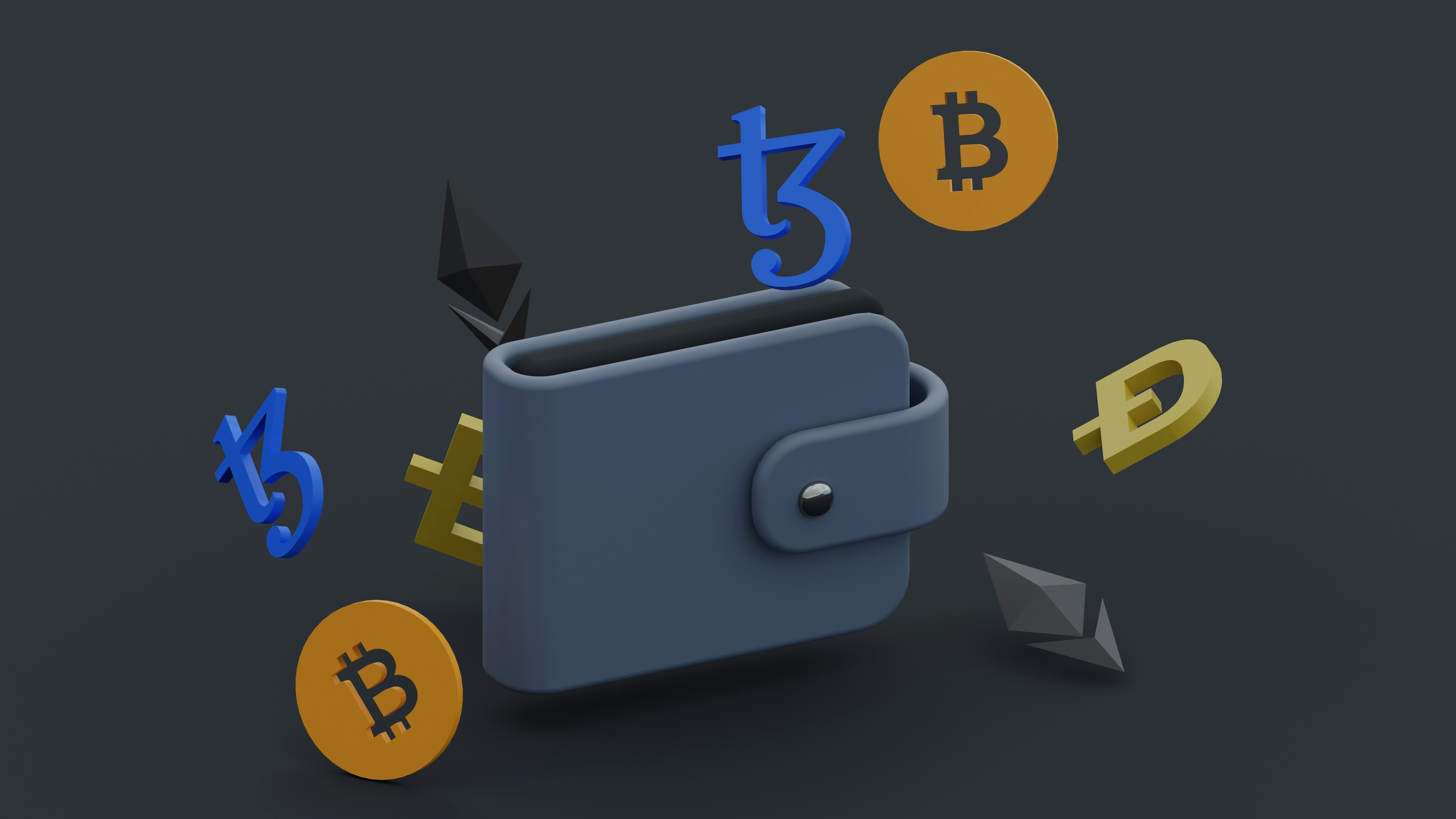
Introduction to Crypto Wallets
A crypto wallet is an essential tool in the world of digital currencies, serving as the interface between users and the blockchain. In essence, it enables individuals to securely store, send, and receive various cryptocurrencies, including popular options like Bitcoin, Ethereum, and countless altcoins. The wallet does not physically hold the cryptocurrency; instead, it manages the public and private keys necessary for accessing and transacting with the blockchain.
To better understand what a crypto wallet is, it’s crucial to delve into the functionality of these keys. The public key resembles an email address in that it can be shared with others to receive funds. Conversely, the private key acts much like a password, granting access to one’s assets and enabling the transfer of cryptocurrency. Anyone in possession of the private key can control the corresponding public key and, thus, the digital assets associated with it. Maintaining the security of this private key is vital, as losing it equates to losing access to the stored assets.
In addition to their core functions, crypto wallets can be categorized into different types based on how they operate. Hardware wallets, for example, provide a more secure offline option, while software wallets are typically easier to use for transactions. Each type has its unique advantages and trade-offs concerning security and convenience. Therefore, it is paramount for users to evaluate their specific needs and understand the various functionalities before deciding on which type of crypto wallet to use. By comprehensively understanding what a crypto wallet is and the roles of public and private keys, individuals can begin to navigate the complex landscape of digital currency with confidence.
Types of Crypto Wallets
In the ever-evolving world of cryptocurrencies, understanding the various types of crypto wallets is essential for effectively managing your digital assets. A crypto wallet serves as a secure digital storage solution for your cryptocurrencies, allowing you to send, receive, and manage your funds seamlessly. Various types of crypto wallets cater to different user needs, each with its unique functionalities and security features.
Firstly, hardware wallets are highly regarded for their security. As physical devices, they securely store private keys offline, making them less susceptible to hacking and malware attacks. Popular options include Trezor and Ledger, which provide users an extra layer of protection against online threats. These wallets are ideal for long-term storage and for those who hold significant amounts of cryptocurrencies.
Software wallets are another option, with two subcategories: desktop and mobile wallets. Desktop wallets, such as Exodus and Electrum, are downloaded and installed on your computer. They offer a balance of security and convenience but can be vulnerable to malware if the device is compromised. Conversely, mobile wallets, like Trust Wallet and Mycelium, allow users to manage their cryptocurrencies on-the-go, promoting ease of access. While mobile wallets provide a user-friendly experience, they may be less secure than hardware wallets.
Web wallets, which operate in a browser or through a web application, are another alternative. These wallets, such as Coinbase and Binance, offer convenience for trading and quick access to funds. However, since web wallets store private keys online, they pose a higher risk of hack and theft. Finally, paper wallets offer a unique offline solution where users generate and print their keys on paper. While extremely secure when created offline, they can be easily lost or damaged.
In conclusion, when considering what is a crypto wallet, it is crucial to evaluate your individual needs, including convenience, security, and usability, to determine which type of wallet suits you best. Understanding these various wallet types can significantly affect your experience in the cryptocurrency landscape.
Hardware Wallets: Security and Convenience
Hardware wallets are dedicated devices designed specifically for the purpose of securely storing cryptocurrencies. They allow users to manage their digital assets in a manner that significantly reduces the risks associated with online storage. Essentially, a hardware wallet functions by storing a user’s private keys offline, making it nearly impervious to cyber threats, such as hacking, phishing, or malware attacks. This method of storage constitutes one of the safest means of managing cryptocurrencies, particularly for individuals who hold substantial amounts or engage in frequent transactions.
One of the primary advantages of hardware wallets is the enhanced security they provide. Since the private keys remain offline, this “cold storage” method ensures that they are not exposed to potential online vulnerabilities. In contrast to software wallets, which can be compromised if the device is infected or hacked, hardware wallets offer a fortified layer of protection. Popular brands, including Ledger, Trezor, and KeepKey, have emerged as leaders in the hardware wallet market, offering varying features, security protocols, and compatibility with different cryptocurrencies.
When considering what is a crypto wallet and which type should I use, hardware wallets are particularly ideal for long-term holders and those seeking maximum security. For transactions involving smaller amounts or for users who trade frequently, software wallets or mobile wallets may suffice, offering convenience and accessibility. However, for significant holdings, a hardware wallet is invaluable. To ensure optimal security, users should always keep their firmware updated and maintain backups of their recovery phrases in secure locations. Additionally, it is imperative to purchase hardware wallets only from trusted manufacturers to avoid counterfeit products that may compromise security.
Software Wallets: Flexibility and Accessibility
Software wallets are a popular choice in the cryptocurrency ecosystem due to their flexibility and ease of use. These wallets can be categorized primarily into two types: mobile wallets and desktop wallets. Each offers unique advantages and experiences that cater to different user needs, making it essential to understand what is a crypto wallet in the context of these software solutions.
Mobile wallets operate on smartphones and tablets, allowing users to manage their cryptocurrency directly from their devices. This accessibility is particularly beneficial for individuals who frequently engage in transactions or wish to make payments on the go. Mobile wallets often come with features such as QR code scanning for swift transactions and portfolio tracking capabilities. However, this convenience comes with certain risks, as mobile devices may be more susceptible to malware and hacking attempts, especially if users are not vigilant in maintaining their device’s security.
On the other hand, desktop wallets are installed on personal computers and generally offer enhanced security compared to their mobile counterparts. They provide a more stable platform for users to store their digital assets safely. Desktop wallets often come with advanced features such as automated backup and recovery options, and they can support a larger number of cryptocurrencies. However, the downside is that users may have limited mobility with their assets since access is confined to devices where the software is installed.
Ultimately, the choice between mobile and desktop software wallets depends on individual preferences and usage scenarios. Users who prioritize on-the-go transactions and convenience might benefit more from mobile wallets, while those who favor security and a robust feature set may find desktop wallets to be more suitable. Understanding what is a crypto wallet, and specifically how software wallets function, helps users to make informed decisions aligned with their specific requirements.
Web Wallets: Ease of Use versus Security
Web wallets represent one of the most convenient forms of cryptocurrency storage, designed for users who prioritize accessibility and ease of use. These wallets are typically hosted online by third-party services and allow users to manage their digital assets through a web browser, enabling quick transactions from virtually any location with internet access. With a simple sign-in procedure, users can effortlessly send and receive funds, making web wallets particularly appealing for those who engage in frequent trading or require speedy transactions.
However, this convenience comes with a significant trade-off—security. Since web wallets store private keys on external servers, they are inherently more vulnerable to theft and hacking attempts. Unlike hardware wallets that provide offline storage, a web wallet’s connection to the internet exposes it to various cyber threats. Therefore, it is crucial for users to select reputable wallet providers that employ rigorous security measures, such as two-factor authentication, data encryption, and regular security audits to safeguard their assets.
When assessing what is a crypto wallet, particularly in the form of a web wallet, consider incorporating additional layers of protection. Utilizing strong, unique passwords, and enabling account recovery options can bolster security while maintaining usability. Users should also be wary of phishing attempts and ensure that they only access their web wallet through direct URLs rather than links from emails or social media.
In line with generating a secure experience, it is wise to limit the balance kept in web wallets. For larger amounts of cryptocurrency, transitioning to a more secure wallet type, such as a hardware wallet, may be advantageous. Despite their inherent risks, when utilized responsibly, web wallets serve as a practical solution for everyday cryptocurrency transactions without sacrificing user experience.
Paper Wallets: Offline Security for Long-term Holding
A paper wallet is a simple, yet effective, form of cryptocurrency storage that involves the physical printing of your private and public keys onto paper. By utilizing this offline method, users can significantly enhance their security against potential cyber threats. Understanding what a crypto wallet is in the context of paper wallets is crucial, as these tools serve as a means to store your cryptocurrencies without any digital footprint.
The process of generating a paper wallet typically begins with a secure, offline wallet generator. This allows you to create your keys away from the internet, mitigating the risk of hacking. Most wallet generators will provide you with a pair of cryptographic keys: a public key, which can be shared with others for sending funds, and a private key, which must be kept confidential to ensure the safety of your assets. Once generated, these keys are printed onto a piece of paper, often accompanied by detailed instructions on how to transfer the coins to this offline wallet.
One of the principal benefits of utilizing a paper wallet is its longstanding reputation for providing enhanced offline security for those who are looking to hold their cryptocurrencies long-term. Since paper wallets do not possess any electronic components, they are immune to online threats such as hacking or malware. However, this method comes with responsibilities; users must ensure that the physical piece of paper is kept safe from damage, loss, or theft. Consider employing protective measures, such as laminating the paper or storing it in a safe deposit box. In addition, having backups of your keys stored in a separate location can act as a safeguard against potential disasters.
In conclusion, paper wallets are an excellent choice for individuals seeking to understand what a crypto wallet is and how to secure their assets for extended periods. Their offline nature, combined with careful handling, can provide peace of mind for long-term cryptocurrency investors.
Factors to Consider When Choosing a Crypto Wallet
When it comes to selecting a crypto wallet, several critical factors must be taken into consideration to ensure both security and convenience. First and foremost, security features are paramount. A crypto wallet serves as the digital vault for your assets, so it is essential to evaluate the security protocols that the wallet provider implements. Look for features such as two-factor authentication, encryption, and seed phrases. A wallet with robust security measures can significantly reduce the risk of unauthorized access and theft.
Ease of use also plays a vital role in your choice. If you are new to the cryptocurrency landscape, a wallet with an intuitive user interface can make your experience much smoother. This includes straightforward processes for sending, receiving, and managing cryptocurrencies. A more complicated interface may deter potential users and lead to operational errors, so choose a wallet that aligns with your level of expertise.
Compatibility with various cryptocurrencies is another important consideration. Not all wallets support every type of cryptocurrency, so it is crucial to verify that the wallet you choose accommodates the specific digital currencies you plan to use. This will save you time and potentially prevent losses in the long run. Furthermore, check if the wallet is regularly updated to support new currencies, as the cryptocurrency market is continually evolving.
Lastly, it is advisable to read user reviews and feedback about specific wallets. Active communities and ongoing support can enhance your overall experience with a crypto wallet. Considering all these factors will help you make an informed decision when selecting the right crypto wallet for your needs. As you navigate this decision-making process, remember to prioritize security, usability, compatibility, and ongoing support to safeguard your cryptocurrency investments effectively.
Common Mistakes to Avoid with Crypto Wallets
As the popularity of cryptocurrencies continues to rise, understanding what is a crypto wallet and which type should I use becomes increasingly important. However, many users often make critical mistakes that can jeopardize their investments. One common pitfall is neglecting security practices. Given the decentralized nature of cryptocurrencies, it is essential to prioritize security measures to protect your assets. This includes using strong, unique passwords, enabling two-factor authentication, and regularly updating wallet software. Failing to implement these security measures can leave your wallet vulnerable to potential hacks.
Another significant mistake is not backing up your crypto wallet. Many users assume their wallet is secure and may not consider the risks of hardware failures, accidental deletions, or lost devices. It is crucial to have a backup of your wallet’s private keys or recovery phrases stored securely in a separate location. This precaution ensures that you can regain access to your funds even if the original wallet is compromised or lost.
Moreover, selecting an unreliable wallet can also lead to financial losses. With various types of wallets available, ranging from software to hardware and online to offline solutions, it is vital to research and choose a reputable option. Look for wallets with a strong history of security, positive user reviews, and regular updates. Avoid wallets that appear suspicious or have limited user feedback to minimize risks associated with lost funds or service outages.
Avoiding these common mistakes can significantly enhance your experience with cryptocurrencies. By ensuring that you understand what is a crypto wallet and which type should I use, as well as implementing robust security measures, backing up your wallet, and choosing reputable providers, you can protect your digital assets effectively. In conclusion, taking these precautions can lead to a more secure and rewarding experience in the world of cryptocurrencies.
Conclusion: Finding the Right Wallet for Your Needs
Understanding what is a crypto wallet and which type should I use is crucial for anyone engaging in cryptocurrency transactions. The diverse range of wallets, including hardware, software, paper, and mobile wallets, serve different purposes and offer varying levels of security and convenience. Assessing which wallet aligns with your cryptocurrency activities is key to safeguarding your digital assets effectively.
As outlined throughout this blog post, the choice of a crypto wallet depends significantly on individual usage patterns and security needs. For instance, hardware wallets provide robust security and are ideal for long-term investors who prioritize safety over accessibility. Conversely, software or mobile wallets might be more suitable for users who engage in frequent transactions due to their convenience and ease of use. Each wallet type possesses unique features, thereby necessitating a careful evaluation of one’s cryptocurrency handling preferences.
Moreover, it is also essential to consider factors such as user interface, fees, and the level of customer support provided by wallet services. Understanding the storage capabilities and transaction limits of these wallets can further guide users towards selections that meet their investment strategies and daily operations. Ultimately, the right wallet serves not only as a secure place to store cryptocurrencies but also as a practical tool for managing and executing trades efficiently.
In conclusion, whether you are a novice or an experienced trader, comprehending what is a crypto wallet and which type should I use is instrumental in navigating the cryptocurrency landscape. By taking the time to evaluate your personal needs and aligning them with the right wallet choice, you can enhance both your security and your overall experience within the digital currency realm.















